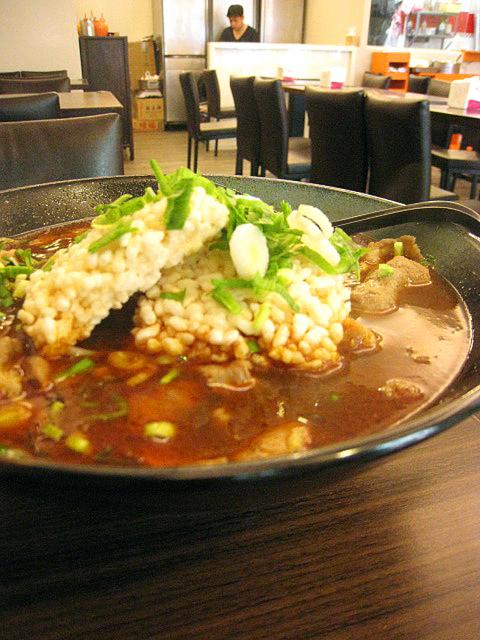With cold weather gradually settling in, thoughts turn to a good hot pot, particularly the sharp heat of chili and the tingle-inducing Sichuan pepper (Zanthoxylum piperitum).
Chili hot pots, or indeed any kind of hot pot, are best enjoyed in the company of three or four people, but such social gatherings are not always possible when the yen for fiery food hits.
One solution is a visit to Han Chi Tiger Noodles (韓記老虎麵食館), an establishment that opened nearly two decades ago and last year relocated to Jinhua Street on the fringes of the Yongkang Street shopping district.

Photo: Ian Bartholomew, Taipei Times
Han Chi’s tiger noodles (老虎麵), the house specialty, are appropriately named: they have a fierce bite.
The tiger noodles come in beef, chicken, mutton or pork, and are served with lamian (拉麵), vermicelli noodles (冬粉) or crispy rice (鍋巴), and in four levels of spiciness.
Whatever your choice, the bowl is NT$180.
I picked the third level of spiciness, expecting a lively number, but previous experience with spicy food in Taiwan prevented expectations from soaring too high.
Lashings of hot but otherwise flavorless chili oil and over-salted preserved chili sauce are the quick and easy way many a restaurant spices up its fare.
A mouthful of soup is often enough to see through the sham, for while the bowl of noodles is red and burns the tongue, there really isn’t that much going on flavorwise.
Han Chi’s tiger noodles are quite another proposition. The dish certainly lit a fire in my mouth, but beyond the burning there was a depth of flavor and layers of spiciness.
The quality of a good chili stock is like a fine wine, with the characteristics of different types of peppers working their way to the fore as you eat.
Having sampled tiger noodles in a number of combinations, the pork seems to work best as the meat is able to draw in the chili and impart some of its own flavor as well.
The quality of the noodles is excellent, but for something a little unusual, one version is served with blocks of crisp rice — something like savory Rice Krispies treats — that are excellent for soaking up rich sauces. Tiger noodles are served with jellied duck blood and tofu skin, both classic accompaniments. (The former can be omitted on request.)
Han Chi’s third level of spiciness exceeds anything in the “medium hot” category of many local restaurants — the fourth level should only be chosen by masochists. Sweat-soaked collars — even when the mercury dips — are far from a rare occurrence at Han Chi.
The restaurant offers many other dishes, not all of them so hot. Its clear beef broth (清燉湯麵, NT$90, or NT$150 with added beef, 清燉牛肉麵) is full of flavor, and its Sichuan-style fried sauce noodles (川式炸醬麵, NT$75) and shaoshao noodles (紹燒麵, NT$75) — a variation on the more typical dandan noodles (擔擔麵) — are both toothsome. Both rely for effect on the high quality of the noodles and a careful preparation of condiments, rather than on a chili bite.
The side dishes at Han Chi should not be neglected, with abalone mushrooms stewed in soy (NT$50) and stewed pig’s intestine (NT$100) deserving special mention for outstanding flavor and texture. A sweet mung bean soup is offered free of charge and is ideal for bringing down the internal temperature.

A vaccine to fight dementia? It turns out there may already be one — shots that prevent painful shingles also appear to protect aging brains. A new study found shingles vaccination cut older adults’ risk of developing dementia over the next seven years by 20 percent. The research, published Wednesday in the journal Nature, is part of growing understanding about how many factors influence brain health as we age — and what we can do about it. “It’s a very robust finding,” said lead researcher Pascal Geldsetzer of Stanford University. And “women seem to benefit more,” important as they’re at higher risk of

March 31 to April 6 On May 13, 1950, National Taiwan University Hospital otolaryngologist Su You-peng (蘇友鵬) was summoned to the director’s office. He thought someone had complained about him practicing the violin at night, but when he entered the room, he knew something was terribly wrong. He saw several burly men who appeared to be government secret agents, and three other resident doctors: internist Hsu Chiang (許強), dermatologist Hu Pao-chen (胡寶珍) and ophthalmologist Hu Hsin-lin (胡鑫麟). They were handcuffed, herded onto two jeeps and taken to the Secrecy Bureau (保密局) for questioning. Su was still in his doctor’s robes at

Last week the Democratic Progressive Party (DPP) said that the budget cuts voted for by the China-aligned parties in the legislature, are intended to force the DPP to hike electricity rates. The public would then blame it for the rate hike. It’s fairly clear that the first part of that is correct. Slashing the budget of state-run Taiwan Power Co (Taipower, 台電) is a move intended to cause discontent with the DPP when electricity rates go up. Taipower’s debt, NT$422.9 billion (US$12.78 billion), is one of the numerous permanent crises created by the nation’s construction-industrial state and the developmentalist mentality it

Experts say that the devastating earthquake in Myanmar on Friday was likely the strongest to hit the country in decades, with disaster modeling suggesting thousands could be dead. Automatic assessments from the US Geological Survey (USGS) said the shallow 7.7-magnitude quake northwest of the central Myanmar city of Sagaing triggered a red alert for shaking-related fatalities and economic losses. “High casualties and extensive damage are probable and the disaster is likely widespread,” it said, locating the epicentre near the central Myanmar city of Mandalay, home to more than a million people. Myanmar’s ruling junta said on Saturday morning that the number killed had